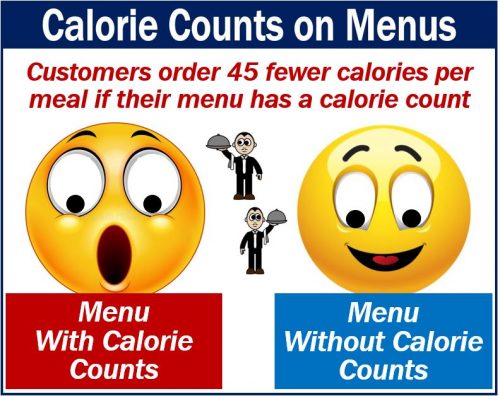Calorie counts on restaurant menus have resulted in customers ordering fewer calories, a new study has found. Orders for calorie-rich entrees and heavyweight appetizers decline when calorie counts are present in restaurant menus.
Researchers from Cornell University carried out a randomized experiment to determine whether calorie counts affected orders.
John Cawley and colleagues found that calorie counts resulted in orders with 45 fewer calories at full-service restaurants. In other words, they ordered 3% fewer calories. Cawley is a professor of policy analysis and management in Cornell University’s College of Human Ecology.
The researchers wrote about their study and findings in the journal National Bureau of Economic Research (citation below).
Calorie counts on menus even influenced people with knowledge about nutrition.
Prof. Cawley said:
“Even if you’re an educated person who eats out a lot and is aware of nutrition, there can still be surprising things in these calorie counts.”

Calorie counts startled chefs
Even the restaurant chefs were startled by how many calories some dishes had. A tomato soup/grilled cheese sandwich combo, for example, has many more calories than most people think.
Regarding chefs’ views on the tomato soup/grilled cheese combo, Alex Susskind said:
“They would have said it was one of the lower-calorie items on the menu.”
Susskind is an associate professor of operations, technology, and information management at Cornell’s School of Hotel Administration.
Barton Willage, an assistant professor of economics at Louisiana State University, was also co-author and a member of the research team. Prof. Willage earned his Ph.D. at Cornell University.
Americans unaware of their calorie intake
The majority of Americans do not have a precise estimate of how many calories they consume each day. This is because one-third of the food they eat is not prepared at home.
Also, America’s obesity crisis has reached epidemic proportions. Over the past five decades, the prevalence of obesity in adults in the country has almost tripled. In 2016, almost forty percent of American adults were obese.
Legislation requiring calorie counts
Subsequently, many states, counties, and cities in the US have passed legislation requiring calorie counts on restaurant menus.
Since May 2018, chain restaurants with 20+ units must post calories on menus and menu boards. This requirement, which applies nationwide, is part of the Affordable Care Act of 2010.
The researchers wanted to determine how this law affected consumer behavior in restaurants. They carried out a randomized field experiment in two full-service restaurants.
There were two groups of diners; the control group and the calorie counts group. The control group had menus without calorie counts on them. The calorie counts group, on the other hand, had calorie information on each dish on their menus.
At the end of each meal, participants had to complete a survey. The survey gathered sociodemographic information as well as people’s attitudes toward exercise and diet.
The researchers gathered and analyzed data on 5,550 diners.
Most people welcomed the calorie counts
The researchers also found that the customers valued the calorie information. Most members of both groups supported have menus with calorie counts. Exposure to menus with calorie counts increased support by almost ten percent.
Prof. Cawley said: “It’s clear that people value this information.”
Restaurants reported no downside to having calorie information on their menus. Their revenue and profit remained the same. Their labor costs also remained the same.
In a different study, researchers at the University of Surrey in England found that changes in meal times can reduce body fat.
Citation
“The Impact of Information Disclosure on Consumer Behavior: Evidence from a Randomized Field Experiment of Calorie Labels on Restaurant Menus,” John Cawley, Alex Susskind, and Barton Willage. National Bureau of Economic Research Working Paper No. 24889, Issued in August 2018. DOI: 10.3386/w24889.

